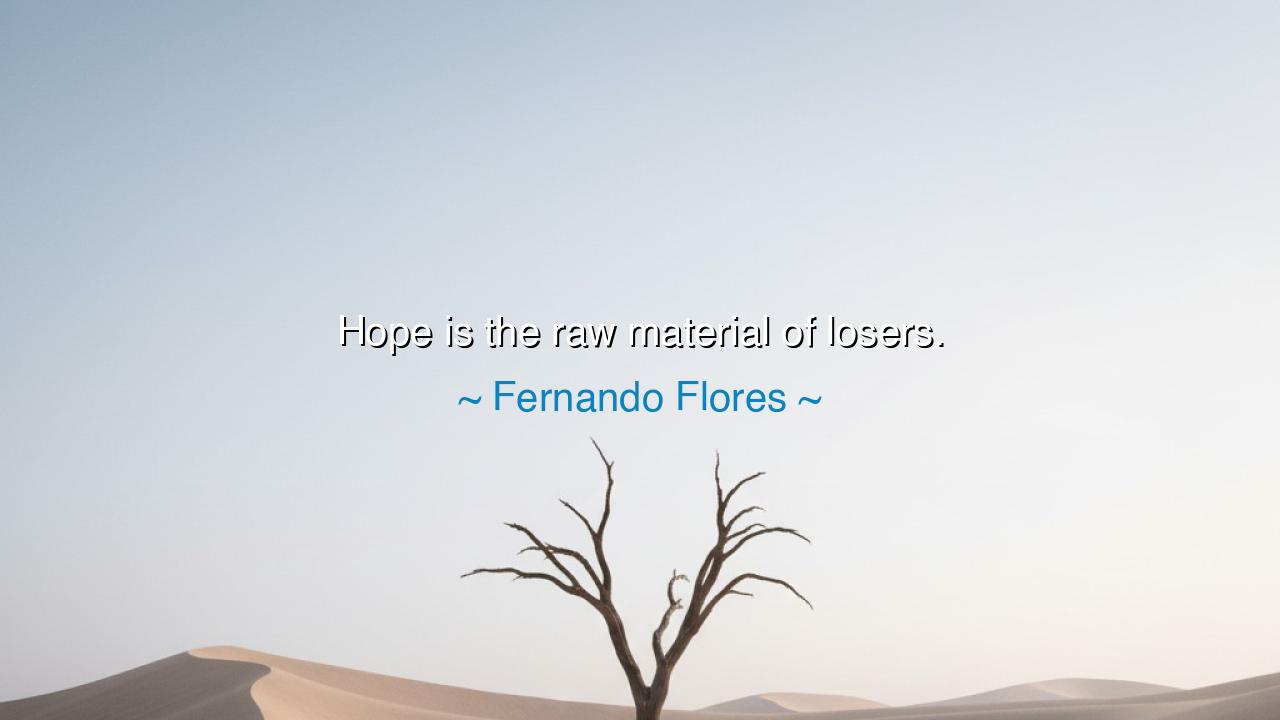
Hope is the raw material of losers.






In the striking and unsettling words of Fernando Flores, “Hope is the raw material of losers,” there lies a hard and ancient truth, one that pierces like a blade through the illusions that often cradle the human heart. At first hearing, these words seem cruel, almost blasphemous to the ears of the dreamer. But listen deeper, and you will hear not contempt, but awakening — a call to rise beyond passive wishing into the realm of action, responsibility, and creation. For Flores, hope unaccompanied by effort is a poison sweet to the taste but deadly to the soul. It soothes the weary spirit while silently binding it in chains of inaction.
The meaning of this quote is not that hope itself is evil, but that hope without will becomes a refuge for those who fear to act. The ancients knew this well. They did not sit by the river praying for the fish to leap into their nets; they cast their lines, built their boats, and ventured into the deep. Flores, a philosopher and statesman forged in the fires of political struggle, speaks with the voice of one who has seen how nations and individuals alike perish when they mistake hoping for doing. Hope may kindle the spark, but it is discipline, decision, and labor that turn the ember into flame. Without action, hope is but the dream of a man who will die still dreaming.
To understand the origin of these words, one must know that Fernando Flores was no idle cynic. A Chilean thinker and technologist, he was imprisoned after the fall of President Allende’s government and later rose to rebuild his life through learning and enterprise. His insight was born not from bitterness but from the clarity of suffering — from seeing how easily people, in the face of loss, retreat into the comfort of hope rather than the fire of transformation. He knew that the world does not yield to wishing; it yields to commitment. Thus his words are not a condemnation of the hopeful, but a challenge to them: Do not hope — act.
There is an echo of this wisdom in the story of Alexander the Great. When his army reached the edge of the known world and his men, weary and fearful, hoped for rest, Alexander did not soothe them with promises. He did not say, “Let us hope for victory.” Instead, he said, “Let us take it.” Hope was not his sustenance; it was his spark. What carried him to glory was not hope but will, that divine force that turns thought into deed and dream into empire. And yet, when his conquests ended and his purpose waned, even Alexander’s hope faded — for hope without new action becomes decay.
But let us not misunderstand. Flores does not teach us to kill hope, but to temper it. Hope is like the raw ore from which iron is forged. If left untouched, it remains dull and useless. But when cast into the furnace of effort, hammered by perseverance, and shaped by wisdom, it becomes strength. The man who merely hopes waits for the world to change him; the man who acts changes the world. Thus, the saying reminds us that the value of hope lies not in its sweetness, but in what it inspires us to do.
In truth, hope alone is passive; it is the waiting posture of the unready. The warrior does not hope the battle will be won — he trains for it. The writer does not hope for words — he wrestles with silence until they come. The lover does not hope for understanding — he speaks, he listens, he endures. To live only by hope is to stand before the locked gates of destiny holding flowers instead of keys. The wise know that the universe favors those who move, not those who wait.
The lesson of Flores’s words, then, is fierce yet liberating: cast away the false comfort of hope that excuses inaction. Replace it with resolve. Hope may open your eyes to possibility, but only your commitment will make that possibility real. Do not sit beneath the tree praying for fruit; climb it. Do not wait for peace; build it. Do not hope to become; become. This is how mortals touch the realm of the divine — by shaping the future with their own hands.
And so, to you who listen: when next your heart whispers, “I hope things will change,” answer it with courage — “Then I will change them.” For in that moment, you cease to be a dreamer and become a creator. You rise from the ranks of those who wait and join the lineage of those who act — those who carve history not with the frail chisel of hope, but with the enduring hammer of will.






AAdministratorAdministrator
Welcome, honored guests. Please leave a comment, we will respond soon